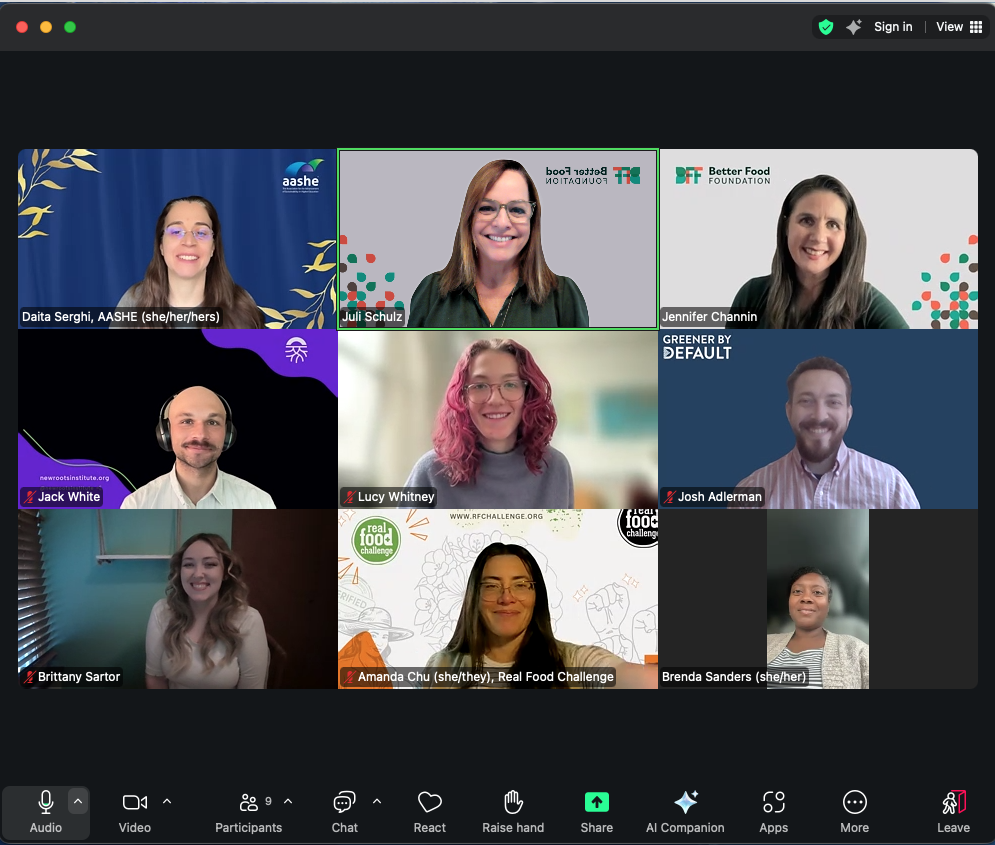The Association for the Advancement of Sustainability in Higher Education (AASHE) celebrated its milestone 20th anniversary at the 2025 Conference & Expo in Minnesota this October. This landmark event brought together sustainability leaders from higher education institutions worldwide to share innovative approaches to reducing campus environmental impacts.
The Better Food Foundation attended, along with five other organizations from the Plant-Based NGO Network, to educate sustainability leaders about plant-forward strategies for their campuses. We hosted presentations, workshop, and networking session with all 5 organizations for attendees.
Food Systems: An Untapped Opportunity for Climate Action
This year’s conference highlighted the crucial role that campus food systems transformation plays in tackling climate challenges. In her compelling keynote address, renowned marine biologist and climate policy expert Dr. Ayana Elizabeth Johnson talked about her book “What If We Get It Right: Visions of Climate Futures,” mentioned food systems as an untapped opportunity for higher education sustainability initiatives.
Three Key Takeaways for Sustainable Campus Dining
1. Language Shifts: Reframing Sustainability Initiatives
At AASHE 2025, sustainability teams demonstrated how adapting communication strategies can increase buy-in across diverse campus communities. Rather than relying solely on sustainability terminology, successful campus initiatives are prioritizing terms like “efficient,” “cost-effective,” and “accessible” when discussing food system changes.
This strategic shift creates unique opportunities, particularly as it aligns with behavioral science principles suggesting that periods of change are ideal for implementing effective “nudges.” The Better Food Foundation’s recent webinar featuring Cass Sunstein, pioneer of nudge theory, demonstrated how nudges can significantly influence behavior without restricting freedom of choice.
2. Celebration in Campus Dining: Making Sustainability Engaging
The second major takeaway emphasizes that successful sustainable campus dining initiatives should be fun and engaging. By promoting positivity around plant-forward dining, universities can help address climate-related eco-anxiety while fostering community connections and encouraging a healthier lifestyle. Dining halls provide an ideal setting for celebration while building meaningful relationships around shared values.
In the conference panel “The Power of Plant-Forward Menus in Achieving College and University Sustainability Goals” with Mohamed Alqamoussi from Humane World, Keith Soster, Director of Sustainability and Student and Community Engagement at the University of Michigan Dining, showcased the university’s award-winning “Sustainable Monday” initiative. This program celebrates campus sustainability efforts, innovative plant-based menu options, food waste recovery, and student and community building activities.
“When we make sustainability fun and delicious, students become enthusiastic participants rather than reluctant followers,” noted Soster. “Our plant-forward dining initiatives are really popular with the students.”
3. Narrative Power: Aligning Food Systems with Institutional Values
The third key insight focuses on storytelling as a tool to connect food systems transformation with core institutional values. Multiple presentations highlighted how narrative frameworks enable sustainability teams to move beyond technical discussions and foster emotional connections with their work.
Dr. Johnson’s keynote particularly emphasized this approach, noting that “sometimes the bravest thing we can do while facing an existential crisis is to imagine life on the other side.” Her work demonstrates how combining science with compelling storytelling leads to more effective advocacy for plant-based sustainability initiatives.
Presentations from The Plant-Based NGO Network
The University of San Diego’s Center for Food Systems Transformation, in collaboration with the Better Food Foundation, hosted presentations, a Nudge workshop, and a well-attended networking session titled “Transforming Campus Food Systems: Cutting Scope 3 Emissions with the Plant-Based NGO Network.” This was also offered to attendees in a webinar directly after the conference.
Representatives from the collaborative network included:
- Better Food Foundation
- Greener By Default
- Humane World for Animals
- New Shift
- Real Food Challenge
- Switch4Good
- University of San Diego Center for Food Systems Transformation

The network includes NGOs that provide comprehensive support for campus dining operations, ranging from education and consulting to procurement support and food-related Scope 3 emissions measurement.
These resources help campus dining services transition to more sustainable, plant-forward dining while supporting universities in meeting their climate commitments and sustainability goals.
Transform Your Campus Food System
The AASHE 2025 conference clearly demonstrated that campus food systems serve as a significant leverage point for climate action. These systems not only connect with students’ everyday experiences but also support broader institutional sustainability commitments.
Ready to transform your campus food system? The Plant-Based NGO Network offers free resources, consultation, and implementation support to help your institution:
- Reduce Scope 3 emissions through menu changes
- Implement successful “defaults & nudges” for plant-forward dining
- Create engaging sustainability narratives
- Connect food initiatives to institutional values
Contact our team today to get started →
Congratulations to the staff and attendees of AASHE on reaching the 20th anniversary milestone. Thank you for fostering the largest gathering for sustainability solutions in higher education.
Latest News
See All NewsThe Coffee Shop Owner’s Guide to Choosing Plant Milks
Discover which plant milks work best for cafes. Compare oat, soy, almond & coconut milk for taste, froth, cost & environmental impact.
How DefaultVeg Interns Are Reshaping Global Food Systems
Discover how DefaultVeg Interns are revolutionizing campus dining by making plant-based options the delicious default.
A Student’s Case for an Oat Milk Default at Duke University
A guest blog by Marielle Williamson, a student at Duke Kunshan University, about the importance of adopting oat milk as the default in coffee shops.